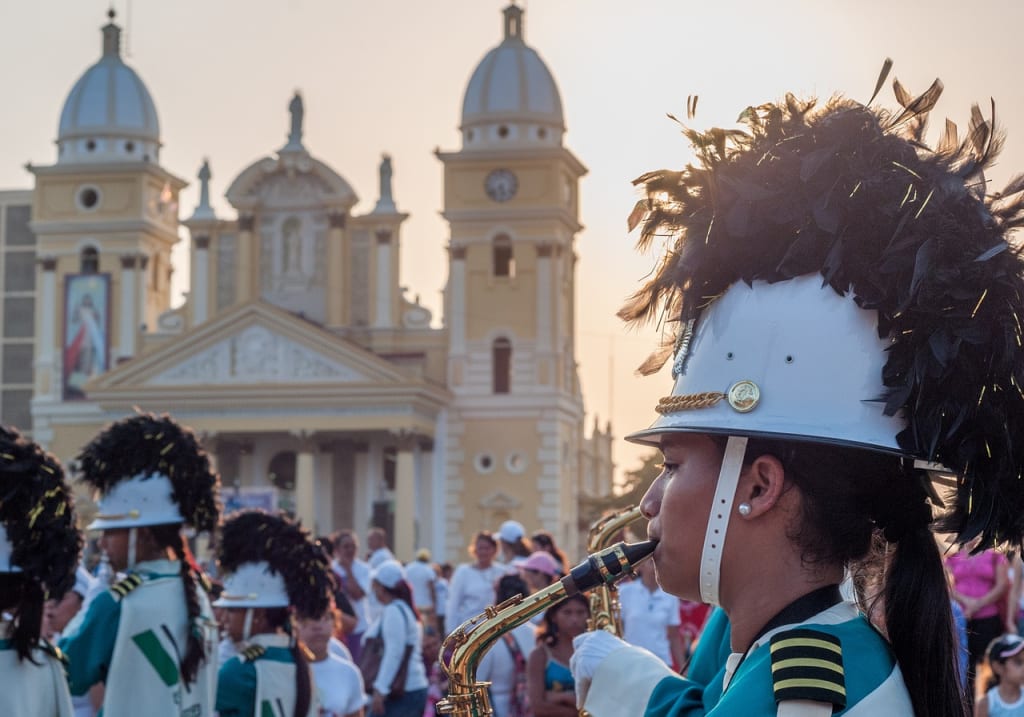My Filipino Story (this being the second in a series in two parts)
(Where our family moves to another country, I attend a catholic private school, and I attempt to rig the a stale, outdated high school hierarchy with a borrowed plan)

It has been brewing in my mind for a few months—the idea of sharing some stories of my experience living in the Philippines—since I began retelling them woven within different funny anecdotes I would share with friends to try to give a sense of how different, sometimes bizarre (if viewed through Americanized eyes), and often illuminating life in a foreign country can be.
I started my fourth grade of primary school there, in the then smallish town of Balayan, situated westward in the province of Batangas. Like much of the Philippines now, thanks to the advent of the internet and boosts in tourism, Balayan can now boast of swanky little beach resorts and spas, restaurants, recreation, and comfortable living accommodations for the adventurous world traveler. Though, back when I lived there throughout most of the eighties, it was a pretty slow paced, sleepy place with the only claim to a moderate degree of fame was its annual Parada ng Lechon (literal translation: parade of suckling pigs) held every feast day of St. John the Baptist on June 24th, and bagoong Balayan, a dubious, extremely salty fish paste sauce (it’s an acquired taste, and delicious on semi-sour un-ripe mangos. Trust me). Its one central feature was a four hundred year old church in its town center which was married to the structure of a school on its right side. This was the catholic school I attended for my primary and secondary school years, Immaculate Conception College.
Immaculate Conception was where you sent your child if you fell under one of these categories: a) you were an age-long town dweller and had clout, an old family name, and were comfortably well off (not ridiculously rich, of course–they send their kids off to a private school in Manila, or better yet, abroad), b) were simply a townie and this was your only choice (otherwise you send them to a public school), or c) were from the outskirt barangays (municipal districts) and desired for your kid to progress on to the high school level of education. Or our family, the rare option “d,” which in our case is also a little bit of option “c,” because we lived in the teeny tiny barangay just a ten minute jeepney ride outside of the town proper, but were transplanted American citizen children of a retired US navy man who decided with his wife to live out his retirement years in his homeland.
Which pretty much translated to being so alien and so far outside of the inner circle of the town‘s close knit culture you could practically see the big red “X” hovering over our heads that indicated how much we stuck out. Even the out of town, barangay-bred kids blended in better.
If we had to point fingers and assign blame, we can potentially look to the Philippines‘ three hundreds years under Spanish rule to give us a little context to how the subtle, but present hierarchy existed and may have influenced the tier we were put in. Spaniards came and went, elements of the culture endured, and lineage, inheritance, and appearance became steadfast markers upon which you were to be judged. Sure, we had the Spanish-sounding last name, and we did hail from the good ole U.S. of A with our nasally twang, so that might have accrued some points, but only counted for a brief period of being novelties (curiosities, really). But we didn’t even live within the town limits, didn’t own a car, have multiple maids, and a humongous, sprawling house on humongous, sprawling hectares of land. Ugh, and that hideous, sun-kissed brown skin! I thought we were adorable as anything, but we weren‘t a flawless, milk bath pale perfection that spoke of mestiza hispanica bloodlines, so we were pretty much doomed.
My poor sister, already being in her teens, suffered a little more from this snub. Aside from the natural shyness that accompanied adapting to new surroundings and routines, I could really care less. In the beginning, at least. The labels of Kano, Amerikano, U.S. dollar, english-speaking, pretty much whizzed over my head without much notice. The side eye and the behind the hand stage whispers of the pretty, fair-skinned, and always immaculately groomed affluent and prominent girls (and some boys) was a little harder to ignore. I already gained a keen second sense of when I was being discussed behind my back, and about three to four months into total immersion in the language, I was pretty proficient in understanding the crude bulk of it, if more reticent about my ability to speak it. It still confounds me to this day how in my eight years living in the Philippines, it never once struck my classmates or instructors odd that I appeared to never quite pick up the language. Oh, I picked up the language alright, and understood every unkind remark said about me. I think my ruse of pretending I was too stupid to grasp the bare basics of the language was a small rebellion on my part. Me thumbing my nose at them and their snobbish ways while being privy to all their salacious trash talk, about me and all the other “less fortunate.”
Naturally, as I got older, because of a combined hodgepodge of factors like my burgeoning adolescence, a more expansive knowledge of how the kingdom was run and who ran it, influence of teenage romance, and life courtesy of Sweet Dreams and Wildfire novels (and OK, you got me, being an outsider was starting to wear too thin), by the summer break following sixth grade, I was brewing up plans on how to buck the system, a so-called “popularity plan.”
In hindsight, I cannot effectively say that there was that common concept of popularity that reigned here, at least not the way many of us perceive it. In this aspect, a lot of American teen high school scenarios probably still influenced me, mostly imagined, since I never attended the secondary level in the U.S. so my only reference really was the healthy plethora of teen angst available in between the pages of books and on the movie screen. Nevertheless, this was the only arsenal I was provided with to defend myself against the next four years of high school like in this school in woeful obscurity, so I took it. Survival until I can escape to the university of my choice, you know? So I armed myself with a strategy of popularity tenets: 1) become pretty, 2) become seen and known, and 3) infiltrate and befriend the enemy camp. Easy plan, sure.
Lucky for me, puberty was helpful with at least the first item on the list. By twelve years old going on thirteen, my calves, hips and chest curved pleasingly, my hair grew out of its ill-advised mullet (a backstreet hairdresser’s bright idea). My nose was now more cute little button mushroom than squashed cherry tomato, my lips and cheeks pink and full. I left sixth grade looking like the Buster Brown illustration on the side of the shoe box, and walked into my first year of high school feeling like a curvier Pinay version of Gloria Estefan of Miami Sound Machine.
The second part of the list kind of fell into my lap initially. During my period there, most schools solved their massive student intake by divvying up the population according to grade percentage—usually four “sections” to which they would give snazzy names: Sampaguita, Ilang-Ilang, Perseverence, Knowledge. By a little bit of an accident, I was placed in the “B level” section instead of with the “A” students. This turned out to be a good thing, because it allowed me to take upon class officer roles that made me more visible to the rest of the student body among the mass of faces. On an unrelated side note, but always super important to me, it was where I became reacquainted with two classmates who became my highschool best friends (and in the case of one, one of my lifelong dearest friends, cemented into family when she made me godmother to her eldest child). Being a class officer allowed me to mingle with representatives of other classes and this in turn made it possible to rub shoulders and have to interact with the alpha squad (if you were wondering, yes, they were all in section A, smart, accomplished, or not. What could I say? It wasn’t exactly fair, but Daddy’s money could get you places).
The third leg of my little tripod campaign was perhaps the most difficult to put into motion. Not so much the mechanics of it, no. I just had to be able to stomach it.
About the Creator
Tricia De Jesus-Gutierrez (Phynne~Belle)
Poet Organizer of Phynnecabulary and Co-Director at the Poetry Global Network. Has too many cats and dogs a-plenty. Enjoys karaoke way too much. https://linktr.ee/phynnebelle/






Comments
There are no comments for this story
Be the first to respond and start the conversation.